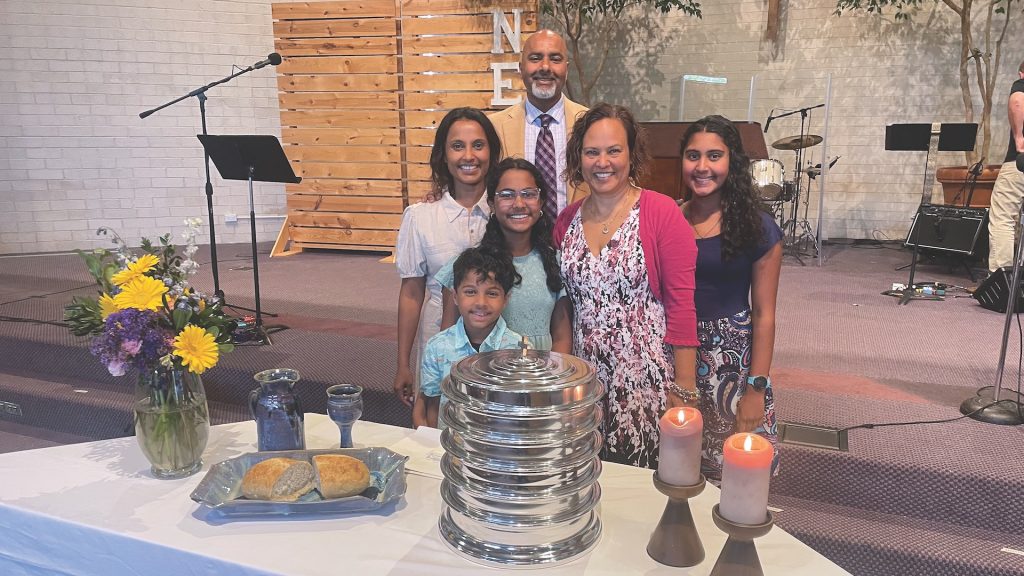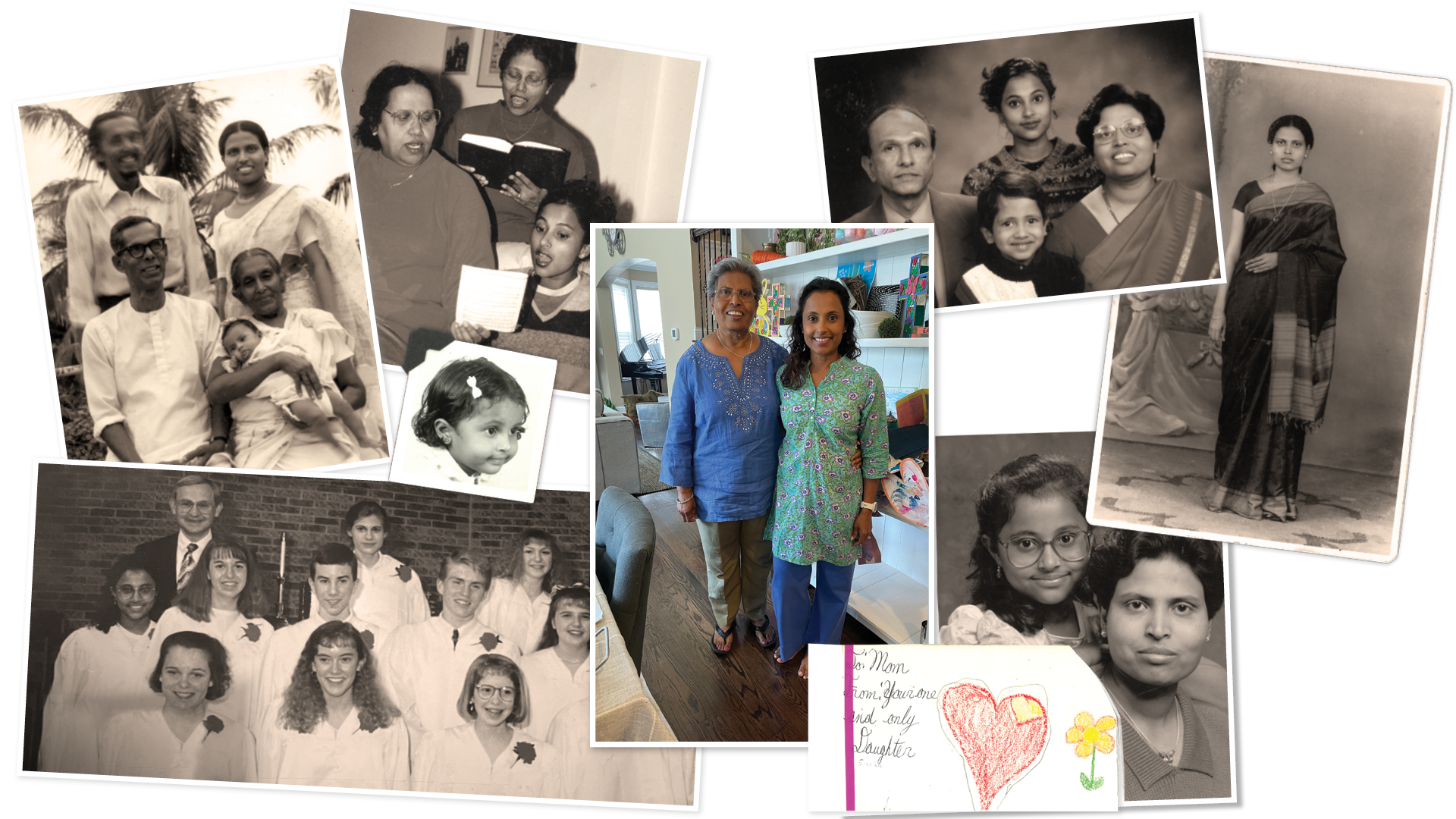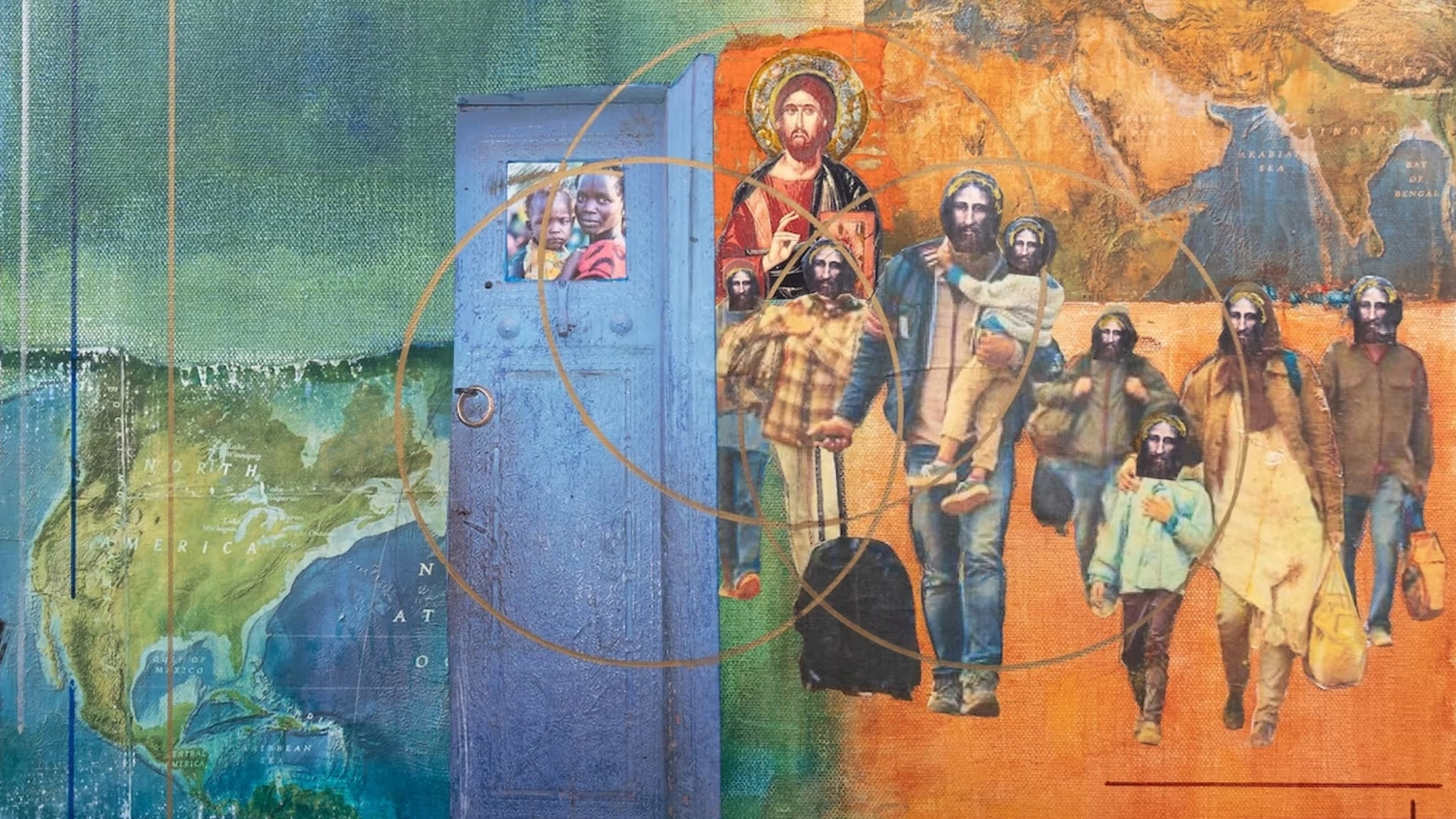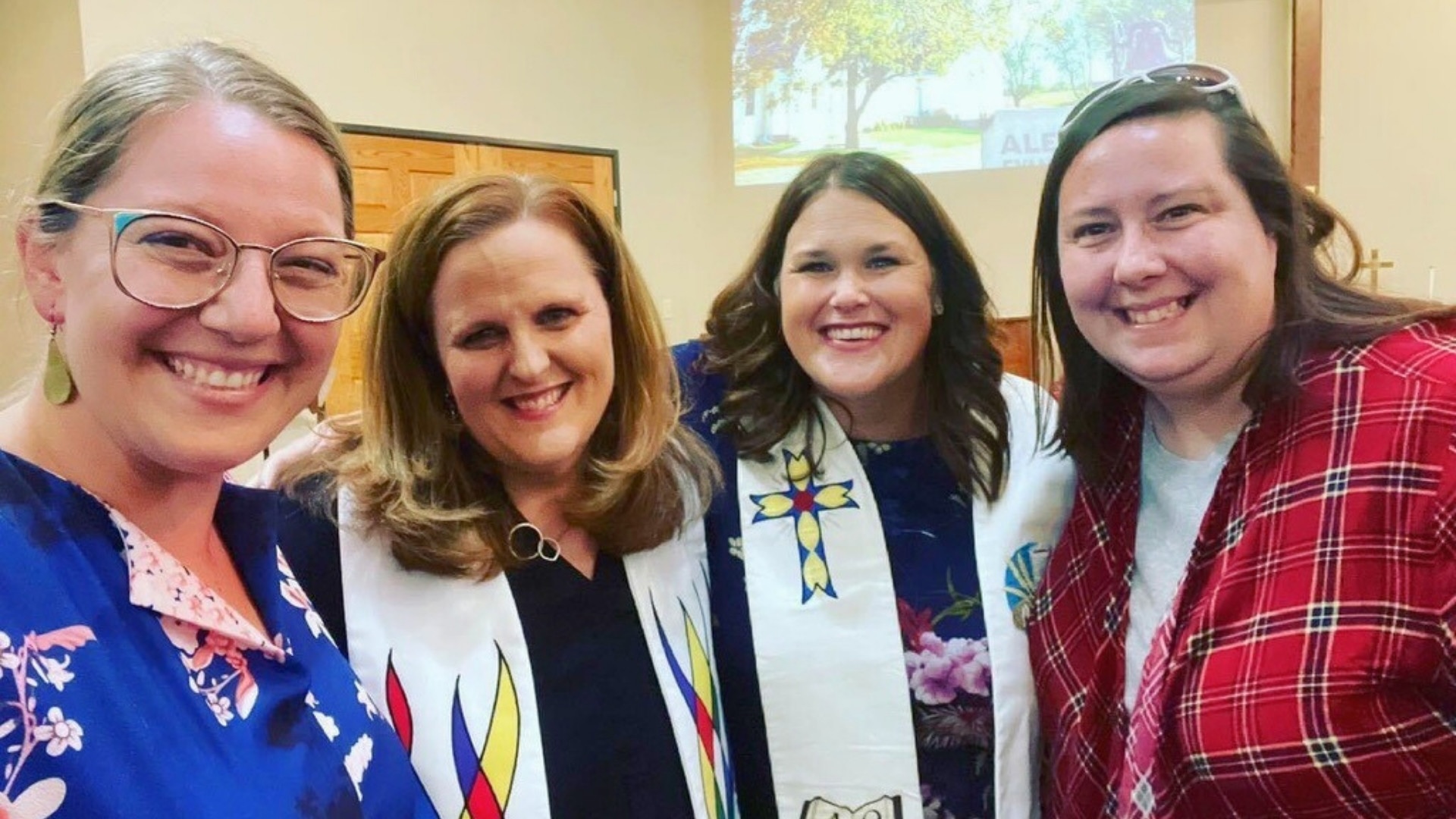Snapshots in the lives of Sneha Augusthy and her mother—from India to confirmation at Community Covenant Church in Lenexa, Kansas, to today.
I walked down the street toward church, holding hands with my mother. Her sandals clacked down the sidewalk lined with 1970s-style homes in Urbandale, Iowa. We could not have looked more different from our surroundings. The year was 1982. I was a three-year-old Indian girl walking with my mother, who was 33, beautiful in her traditional saree, her hair pulled back tight and low. We had recently immigrated to America from the giant, dusty, noisy, and largely impoverished city of Chennai, India, to the tranquil, orderly rows of tidy and well-kept homes in suburban Iowa.
My mother, Crissy, was the third of four girls, raised in a home with Christian parents. Sunday school, morning and evening church services, and prayer consumed her Sundays. But heartache ripped her away from her familiar surroundings, and she was now consumed with an overwhelming and disorienting new focus, “The reason I came to this country was not because I wanted to come to this country,” my mother told me.
I, as all happy children are, was oblivious as we walked that morning. I didn’t know it, but I no longer had a father. He had passed away, and I was too young to understand how that had changed our whole life course.
When we boarded the plane to America weeks before, leaving all we knew, I innocently hugged my grandparents and exclaimed, “Nalla Verum!” Meaning, “I’ll be back tomorrow!” They, of course, knew I would not be returning. My mother and I were leaving for good. She was attempting to give me the future my father would have wanted for me while escaping the unwelcome evil eyes now cast upon her, “As a widow in India, you were definitely considered taboo,” she told me.
At that time in America, you needed sponsors to immigrate. My mom’s sister and husband took on the task of helping us settle and assimilate. They provided shelter and assisted with my mother’s re-education as her master’s level degrees in India no longer held any weight. My aunt and uncle became the hands and feet of God’s plan for my mother and me. They had settled in Iowa years before, found Urban Heights Covenant Church down the street, and walked along with us to church that morning.
They took the time to know us, celebrate with us, mourn with us, and walk alongside us in so many ways.
Decades later, I still remember the brick exterior, the narthex, and the hexagonal sanctuary with wood paneled ceiling and sunlight that streamed in on Sunday mornings. I remember the beige carpet and long hallways. I also remember Pastor Glen Lindell. In my young immigrant mind, he was like Santa Claus: tall, fair, white-haired, jolly, and friendly. He had a big voice that was tender and felt safe. Mostly, I remember that he and his wife, Maynette, made it a point to welcome us. I don’t know what they said, but it felt like they cared.
In the time that followed, we continued to experience care in the congregation of Urban Heights Covenant Church. As my mother pushed herself to learn to drive, go to school, and battle what she called the “disturbing” cold winds of Iowa, women of the church kept checking in with us to see how we were adjusting.
The history of faith in my family dates back centuries. My mother grew up in the Mar Thoma Church, established on the Malabar Coast of South India, in Kerala. The church’s history dates back to the disciple Thomas (Thoma) in AD 52. Tradition states that Thomas came to establish his church and begin evangelizing as part of Christ’s commission. My maiden name is Thomas.
My great-grandfather, raised in the Christian faith in the 1800s, left his stable vocation as a government employee to plant a Mar Thoma church in Adoor, which is still there today. It was risky to become a pastor and rely entirely on the financial support of his small church. His wife, my great-grandmother, taught my mother hymns such as, “His Eye Is on the Sparrow,” “I Need Thee Every Hour,” and “How Great Thou Art.”
“I didn’t memorize Bible verses, but I knew many songs, and they still give me comfort,” my mother says. When she heard those same songs sung at Urban Heights Covenant Church, she felt a connection to home. “God is very mysterious. He knew I would need those songs so many years later,” she says.
My mother married my father, Thomas T. Thomas, at the age of 27, full of the anticipation of a young bride. He studied chemistry. She studied dietetics. They spent years in the tenderness of their newlywed stage and learned they would welcome a baby girl. One day, when my father was off fulfilling his role as a chemistry professor in a distant town, he went to bed and never woke up. He was 30 years old. I was not yet two months old.
My father was at my baptism just two days before he died. In his last fatherly act, he committed my life to Christ. His role as my earthly father was ending, but he handed me over to our eternal Father before he unexpectedly passed.
My father’s death marked the end of a lot of things for my mother; most significantly, it was the end of her faith. “When he died, my whole boat tipped over, and I didn’t know how to swim. So, then I said, ‘This is not a loving God.’” Her upbringing in church had not equipped her to suddenly become a single mother and widow. “He was my anchor. He had great faith. Every Sunday, even if I didn’t go, he’d get up and go to church.”
In a patriarchal society where widows and their children were discarded and regarded as bad luck, she knew it would be difficult to remarry. “Who would remarry me there, tell me? No one.” She stopped praying, and her heart hardened toward God.
My mother decided to take the chance at what she felt my father would have wanted for her. “He knew that places like the US would have opportunities, and he wanted to go there, so I sort of felt that he would want our daughter, Sneha, to also have those opportunities. I wasn’t enthusiastic because I knew it would be a lot of work.” When she left, her father prayed that her faith would return.
After two years in Urbandale, my mother got a job in Kansas City. Astonishingly, Pastor Lindell had retired to Kansas City, where he had been one of the founding pastors of Hillcrest Covenant Church. When we happened to find a home in the area, he and Maynette offered to drive my mother and me to church as often as we could go.
We moved again to a nearby town, and Pastor Lindell’s son-in-law, Tom Anderson, became pastor of Community Covenant Church just down the street from our new home. Pastor Anderson and his wife, Sandy, kept a close eye on us. His sermons were transformative for both my mother and me. His gift of words and biblical truths opened the door for my mother’s faith once more.
In 1992, my mother was remarried to Rajan Kaleekal, the man I now consider my father, and they had a son. My brother, John, and I were both confirmed at Community Covenant.
Through the years, Pastor Lindell and Pastor Anderson’s close walks with our family enormously impacted our sense of belonging. They made it a point to attend all of our big family celebrations, birthdays, and funerals. Pastor Anderson helped officiate my wedding, and the women of Community Covenant threw my wedding shower. They took the time to know us, celebrate with us, mourn with us, and walk alongside us in so many ways.
As a young child who did not have a father, I never felt unseen. People at our church knew me by name. I was known and looked after. I attribute my faith to the strength and example of my mother and grandparents and also to that sense of belonging I experienced in the Covenant. The long-lasting impact left an impression and a longing in me to find the same kind of community for my children.

Sneha with her family and her daughter’s mentor celebrating confirmation at Naperville (Illinois) Covenant Church in May 2024.
Now parents of two girls and a young boy, my husband and I looked for a Covenant church when we moved to Naperville, Illinois. At first, we could not attend in person with my medically fragile son, but online worship during the Covid-19 pandemic allowed us to be part of the church family. When things started to feel safer, we began attending in person. I now serve on the board of spiritual life and volunteer as part of the worship team. Our daughters were confirmed at Naperville Covenant Church, lead the church’s youth worship team, attend Covenant camps, and participate in youth programs.
I recently asked my mother what she thought her journey would have been like in America without her experience in the church. She says, “The Covenant Church helped me to know that God is still in control and I can have a community. They were like a fortress for me. They gave me security and foundation.”
Our journey is a beautiful example of how Jesus wanted life within a church to work, protecting widows and the fatherless child, as we read in Psalm 68:5: “Father of the fatherless and protector of widows is
God in his holy habitation.”
Now, 40 years after my first visit to Urban Heights, our story continues, reminding me that when we take the opportunity to welcome others into our church community, we might be astonished at the eternal story God will write with it.














